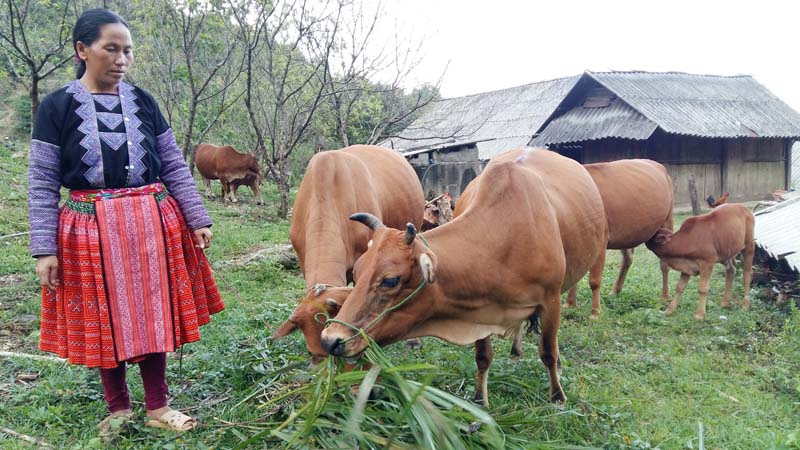
(HBO) – A smooth concrete road leads to Hang Kia commune, Mai Chau district, cows graze on the hill slope, and chickens run on houses’ yards. The picture demonstrates the better life of H’Mong ethnic people in Hang Kia.
has a sustainable livelihood from cow breeding after becoming
involved in a local poverty reduction project.
In 2012, Vang Y My, together with other women in Hang Kia 2 hamlet, received a
loan to buy a breeding cow under the project. My also received assistance in
the form of training from the project in taking care of her cow. After five
years, the cow gave birth to four calves, helping her family escape from
poverty. Now, she also raises chicken and pigs, and grows corn, plums and
edible canna to increase her income.
From 2016 – 2018, the project focused on improving infrastructure and living
conditions of H’Mong ethnic people in the area, which was an especially poor
area. A 50 cubic-metre water container in Thung Mai hamlet was built, ensuring
clean water supply for 53 local households, even in dry season.
Under the project, a communal house in Thung Man hamlet was put into use. The
commune road network was also significantly improved. Inter-hamlet roads in
Hang Kia commune were concretised at a cost of 1.7 billion VND. Concrete roads
to fields in Thung Mai, Pa Khom, Thung Man hamlets have also been made to
facilitate transport of materials and agricultural products, each costing
around 300 million VND (13,200 USD).
Kha A Pao, a member of Hang Kia commune’s development board said infrastructure
construction and livelihood assistance sub-project were particularly useful for
local residents. Thanks to roads, clean water supply stations and communal
houses built with support from the project, the living conditions of locals
have remarkably improved. All works were implemented effectively under close
monitoring and inspection. Livelihood assistance was made with careful study,
thus proving effective to reduce poverty in a sustainable manner.
Hang Kia commune is a disadvantaged area with low per capita income average,
and more than half of the commune’s household living under the poverty line.
The project has helped ease the difficulty and improve the living and
production conditions of H’Mong people in the commune. Dozens of poor
households now have stable livelihoods like Kha Y Do, Vang Y My in Hang Kia 2
hamlet, and Kha A Tru in Thung Mai hamlet.
Following the direction of the Vietnam Women's Union (VWU) Central Committee, the Hoa Binh provincial Women's Union has proactively and extensively implemented the "Godmother" programme with various practical and creative solutions to support and care for children who become orphans due to the COVID-19 pandemic and other causes. As many as 448 children have received both material and spiritual assistance in the 2021–2025 period.
More than just an information technology teacher, Bui Van Nien is an inspiring figure who has nurtured the scientific curiosity and creative spirit of students in Vietnam’s ethnic minority communities.
Da Bac is the most disadvantaged mountainous district in Hoa Binh province, with ethnic minorities accounting for about 90% of its population. Over the past years, the district has mobilised resources to implement ethnic policies to improve the quality of life of local people.
In recent years, Hoa Binh province has consistently prioritised the protection, care, and education of children, particularly those from ethnic minorities and disadvantaged backgrounds, by creating a safe, healthy, and nurturing environment for their all-round development.
The Steering Committee for Tobacco Harm Prevention and Control of Hoa Binh province, in coordination with the Tobacco Harm Prevention and Control Fund, held a ceremony on May 28 in response to the World No Tobacco Day (May 31) and the National No Tobacco Week (from May 25 to 31). The event was chaired by Nguyen Van Toan, Standing Vice Chairman of the provincial People’s Committee and head of the Steering Committee.
Since 2021, the Center for Industrial Promotion and Industrial Development Consulting (CIIDC) under the Department of Industry and Trade has been implementing a school lighting model as part of the plan for using energy efficiently and economically in Hoa Binh Province in the pẻiod of 2021 - 2025. This model not only aims to improve the learning conditions and enhance the education quality, but it also promotes the message of energy saving, energy security, environmental protection and contributes to the goals of socio-economic development.



